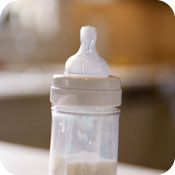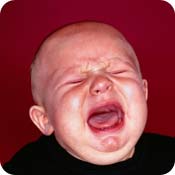 Choosing commercially prepared formula to feed your baby is an important decision. What you feed your baby now provides the foundation for future health and development. Be sure to talk with your baby's doctor about the appropriate infant formula for your baby. Your baby's doctor is the best person to provide recommendations about your baby's nutritional needs. You should never change formula without first checking with your baby's doctor.
Choosing commercially prepared formula to feed your baby is an important decision. What you feed your baby now provides the foundation for future health and development. Be sure to talk with your baby's doctor about the appropriate infant formula for your baby. Your baby's doctor is the best person to provide recommendations about your baby's nutritional needs. You should never change formula without first checking with your baby's doctor.
Feeding Time:
- It is not necessary to warm formula before feeding it to your baby. If you prefer to warm your baby's formula, you can:
- Hold the bottle under warm running tap water.
- Heat it in a pan of warm water on the stove (do not let the formula boil).
- Test the temperature of the formula by shaking a few drops of it on the inside of your wrist before feeding it to your baby. It should not feel hot.
- CAUTION: Microwaves should never be used to warm bottles of formula. The formula warms unevenly. Babies have been seriously burned from formula heated in microwaves.
- Choose a comfortable chair and hold your baby in your arms with her head higher than the rest of the body. Keep the bottle angled during feeding to help prevent your baby from swallowing too much air. The nipple should stay full with formula as your baby nurses. Relax and enjoy this special time with your baby. Your warmth, touch and eye contact will help your baby to feel secure and loved.
- Avoid propping your baby in bed or in an infant seat with a bottle. This could cause choking. Also, when your baby falls asleep with a bottle in his mouth, the formula bathes the teeth and can promote tooth decay and ear infections. Propped bottles also deprive your baby of needed closeness with you.
- Burp your baby to remove uncomfortable air bubbles. Babies usually need to be burped in the middle and at the end of feedings. Gently rub or pat your baby's back while holding your baby over your shoulder, or on your lap. Your baby's chest should lean slightly forward and be supported by your hand.
- Young babies usually spit up a little after each feeding, especially while being burped. This is normal. If your baby spits up a large amount regularly, with force, check with your doctor. To limit spitting up, try to keep your baby calm and relaxed before and during feedings. Loosen the bottle cap a little after tightening it. Hold the bottle at an angle so that the entire nipple stays filled while feeding. Burp your baby soon after beginning a feeding, during the middle, and at the end of each feeding.
- Usually your baby will not need extra water. Formula and/or breast milk provide plenty of fluid. Extra water may be needed to prevent dehydration if your baby is exposed to hot weather for several hours. Offer 2-4 ounces of plain tap water one or two times a day. Use cold water and let the water run a few minutes. Do not add sugar, honey, syrups, or other sweeteners. Do not feed more than 8 ounces of water in a day.
- Rinse bottles and nipples with cold water immediately after feeding to make cleaning easier. Squeeze water through the nipple holes when cleaning and rinsing nipples.
Baby's Feeding Routine:
- Plan to bottle feed on demand. Trying to impose a feeding routine will only frustrate you and your baby.
- Let your baby decide how much to drink. It is fine not to finish a bottle. If your baby has six or more wet soppy diapers a day, seems content between feedings and has a steady weight increase, your baby is probably getting enough. If not, check with your doctor.
- Formula-fed babies usually take 20 to 30 minutes to finish a bottle.
How Much Formula?
Continued ›
|
 Choosing commercially prepared formula to feed your baby is an important decision. What you feed your baby now provides the foundation for future health and development. Be sure to talk with your baby's doctor about the appropriate infant formula for your baby. Your baby's doctor is the best person to provide recommendations about your baby's nutritional needs. You should never change formula without first checking with your baby's doctor.
Choosing commercially prepared formula to feed your baby is an important decision. What you feed your baby now provides the foundation for future health and development. Be sure to talk with your baby's doctor about the appropriate infant formula for your baby. Your baby's doctor is the best person to provide recommendations about your baby's nutritional needs. You should never change formula without first checking with your baby's doctor..jpg)





Member Comments